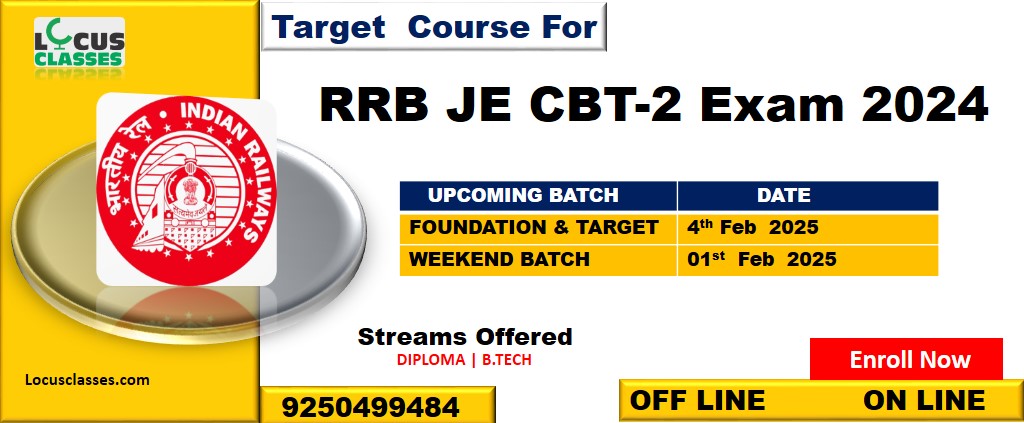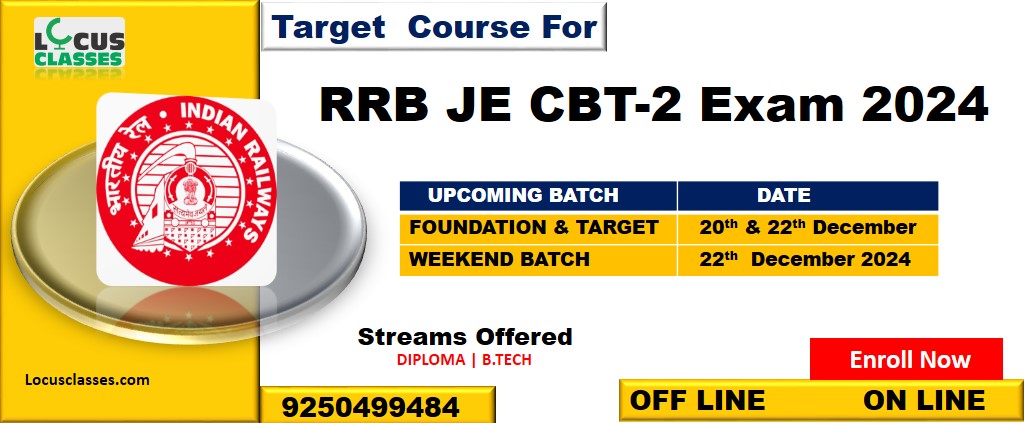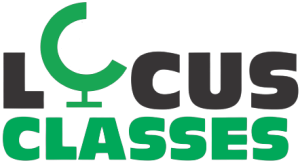RRB JE CBT -2 Exam | Best Coaching For RRB JE CBT -2 In Delhi | Join Locus Classes For RRB JE CBT -2

The Railway Recruitment Board (RRB) Junior Engineer (JE) Computer-Based Test 2 (CBT 2) is a crucial stage in the selection process, assessing candidates on various subjects. The exam comprises 150 multiple-choice questions, each carrying one mark, with a total duration of 120 minutes. A negative marking of 1/3rd mark is applied for every incorrect answer.
RRB JE CBT 2 Syllabus:
- General Awareness (15 Questions):
- Knowledge of current affairs
- Indian geography
- Culture and history of India, including the freedom struggle
- Indian polity and constitution
- Indian economy
- Environmental issues concerning India and the world
- Sports
- General scientific and technological developments
- Physics and Chemistry (15 Questions):
- Topics up to the 10th standard CBSE syllabus
- Basics of Computers and Applications (10 Questions):
- Architecture of computers
- Input and output devices
- Storage devices
- Operating systems (e.g., Windows, Unix, Linux)
- MS Office
- Internet and email
- Websites and web browsers
- Networking
- Computer viruses
- Basics of Environment and Pollution Control (10 Questions):
- Basics of environment
- Adverse effects of environmental pollution
- Pollution control strategies
- Types of pollution
- Waste management
- Global warming
- Acid rain
- Ozone depletion
- Technical Abilities (100 Questions):
- Discipline-specific topics related to the candidate’s engineering background
For comprehensive preparation, Locus Classes offers specialized coaching for the RRB JE CBT 2 exam. Their program includes expert faculty, structured course material, daily live classes, and mock tests to enhance your readiness.
Locus Classes is located in Laxmi Nagar, Delhi, making it accessible for candidates in New Delhi. They provide regular classes with peers of a similar mindset, fostering a supportive learning environment.
For more information on their programs and enrollment details, you can visit their official website:
Additionally, Locus Classes offers online resources and video lectures through their YouTube channel, which can be beneficial for your preparation.

The RRB JE CBT 2 Electrical Syllabus focuses on domain-specific topics related to electrical engineering. Here’s a detailed breakdown:
1. Basic Concepts
- Concepts of current, voltage, power, and energy
- Ohm’s law and Kirchhoff’s laws
- Series and parallel circuits
- Star and delta connections
2. Circuit Theory
- AC fundamentals
- Phasor diagrams
- Complex numbers and their applications in AC circuits
- Network theorems (Thevenin, Norton, Superposition, etc.)
- Resonance in AC circuits
3. Electrical Machines
- Transformers:
- Principles of operation
- Constructional features
- Types and applications
- Efficiency and losses
- DC Machines:
- Types (series, shunt, and compound)
- Principles of operation
- Characteristics and applications
- AC Machines:
- Synchronous and induction motors
- Alternators
- Single-phase and three-phase motors
- Torque-slip characteristics
4. Power Systems
- Generation, transmission, and distribution of electrical power
- Types of power plants (thermal, hydro, nuclear, etc.)
- Circuit breakers and relays
- Substation equipment
- Concepts of load factor, diversity factor, and power factor
5. Control Systems
- Feedback control systems
- Block diagrams and signal flow graphs
- Transfer functions
- Stability analysis (Routh-Hurwitz and Nyquist criteria)
- Basics of programmable logic controllers (PLCs)
6. Electrical and Electronic Measurements
- Measurement of voltage, current, power, and energy
- Use of voltmeters, ammeters, wattmeters, and energy meters
- Measurement errors
- Instrument transformers
7. Analog and Digital Electronics
- Analog Electronics:
- Diodes, transistors, and operational amplifiers
- Rectifiers, filters, and voltage regulators
- Oscillators and amplifiers
- Digital Electronics:
- Logic gates and Boolean algebra
- Flip-flops, counters, and registers
- Analog-to-digital (ADC) and digital-to-analog converters (DAC)
8. Power Electronics
- Semiconductor devices (SCR, MOSFET, IGBT)
- AC-DC, DC-DC, and DC-AC converters
- Speed control of AC and DC motors
- Industrial applications
9. Utilization of Electrical Energy
- Electrical heating and welding
- Lighting systems
- Traction systems: types and operation
- Energy conservation and management
10. Basics of Communication Systems
- Modulation and demodulation techniques
- Basics of fiber optics and satellite communication
Preparation with Locus Classes:
- Live Classes: Expert-led sessions for better conceptual clarity.
- Mock Tests: Regular assessments for self-evaluation.
- Study Materials: Comprehensive and updated notes covering the entire syllabus.
- Doubt Resolution: Dedicated sessions for addressing doubts.
This syllabus aligns with the official RRB guidelines, ensuring thorough preparation. For batch details or online/offline coaching options, visit Locus Classes.
The RRB JE CBT 2 Electronics Syllabus is designed for candidates specializing in electronics engineering. Below is a detailed topic-wise syllabus:
1. Basic Electronics
- Semiconductor materials and properties
- Diodes and their applications (rectifiers, clippers, clampers)
- Transistors (BJT, FET, MOSFET): Principles, configurations, and characteristics
- Operational amplifiers and their applications
- Zener diodes and voltage regulators
2. Digital Electronics
- Number systems and conversions (binary, octal, hexadecimal)
- Logic gates and Boolean algebra
- Simplification of Boolean expressions (K-map)
- Flip-flops, latches, counters, and shift registers
- Multiplexers, demultiplexers, encoders, and decoders
- Analog-to-digital (ADC) and digital-to-analog converters (DAC)
- Basics of microprocessors and microcontrollers
3. Electronic Devices and Circuits
- P-N junction diodes and their characteristics
- Amplifiers: Class A, B, AB, and C amplifiers
- Oscillators: Hartley, Colpitts, and crystal oscillators
- Feedback amplifiers and their types
- Power amplifiers and voltage regulators
4. Communication Systems
- Modulation and demodulation (AM, FM, PM)
- Pulse modulation (PAM, PWM, PPM)
- Basics of fiber optics and satellite communication
- Noise in communication systems
- Transmission lines and their characteristics
5. Signal Processing
- Signals and systems: Definitions and properties
- Fourier transform and Laplace transform
- Filters: Low pass, high pass, band pass, and band stop
- Basics of signal sampling and reconstruction
6. Electronic Measurements and Instrumentation
- Measurement of voltage, current, power, and resistance
- Oscilloscopes and signal generators
- Sensors and transducers (temperature, pressure, displacement, etc.)
- Basics of digital instruments and their applications
7. Control Systems
- Feedback systems and their types
- Transfer functions and stability analysis
- Block diagrams and signal flow graphs
- Basics of PLCs (Programmable Logic Controllers)
8. Power Electronics
- SCR, TRIAC, DIAC, IGBT: Characteristics and applications
- Rectifiers: Single-phase and three-phase
- Inverters and converters
- Motor speed control using power electronics
9. Basics of Computer Systems
- Microprocessors and microcontrollers: Architecture and applications
- Memory devices: ROM, RAM, Flash memory
- Basics of networking and communication protocols
- Operating systems basics
10. Basics of Electrical Engineering
- Concepts of current, voltage, power, and energy
- AC and DC circuits
- Transformers and their applications
- Electrical machines (motors and generators)
Preparation Highlights at Locus Classes:
- Live and Recorded Classes: For concept clarity and flexibility.
- Mock Tests: To simulate exam-like conditions.
- Doubt Solving: Personalized doubt clearance sessions.
- Study Materials: Updated resources covering all syllabus topics.
For offline or online batch enrollment and additional details, visit Locus Classes. Their coaching ensures comprehensive preparation for RRB JE CBT 2 Electronics.
1. Programming and Data Structures
- Basics of programming concepts
- C, C++, Java, and Python fundamentals
- Arrays, strings, linked lists, stacks, queues, and trees
- Searching and sorting algorithms
- Recursion and dynamic programming
2. Operating Systems
- Basics of operating systems: Processes, threads, and scheduling
- Deadlocks: Causes and avoidance
- Memory management: Paging, segmentation, and virtual memory
- File systems and I/O management
3. Database Management Systems
- Fundamentals of DBMS: Data models and schemas
- SQL: Queries, joins, and transactions
- Normalization and indexing
- Basics of NoSQL databases
- Database recovery and concurrency control
4. Computer Networks
- OSI and TCP/IP models
- Networking devices: Routers, switches, hubs
- Protocols: HTTP, FTP, SMTP, SNMP, DNS
- IP addressing and subnetting
- Basics of network security and cryptography
5. Software Engineering
- Software development life cycle (SDLC)
- Agile methodologies
- Software testing: Types and techniques
- Basics of project management and quality assurance
6. Web Technologies
- HTML, CSS, and JavaScript basics
- Web frameworks (e.g., Angular, React)
- Client-server architecture
- Basics of web hosting and domain management
7. Data Science and Machine Learning
- Basics of data analysis and visualization
- Introduction to machine learning concepts
- Supervised and unsupervised learning
- Popular tools: Python, R, and TensorFlow
8. Computer Organization and Architecture
- Number systems and Boolean algebra
- CPU architecture: ALU, registers, and memory hierarchy
- Instruction set architecture (ISA)
- Basics of microprocessors and microcontrollers
9. Theory of Computation
- Finite automata and regular expressions
- Context-free grammar and languages
- Turing machines and computability
- NP-completeness and complexity theory
10. Basics of Cybersecurity
- Information security fundamentals
- Types of cyberattacks and their prevention
- Firewalls and intrusion detection systems
- Basics of ethical hacking and penetration testing
Preparation with Locus Classes:
- Live Classes: Interactive sessions for deeper understanding.
- Mock Tests: Regular practice aligned with the RRB JE pattern.
- Study Materials: Comprehensive and syllabus-oriented content.
- Doubt Clearance: Dedicated sessions for addressing doubts.
For more details about offline and online classes, visit Locus Classes. They offer tailored coaching programs for RRB JE Computer Science to ensure holistic preparation.
The RRB JE CBT 2 Mechanical Syllabus is designed for candidates specializing in mechanical engineering. Below is the topic-wise syllabus:
1. Engineering Mechanics
- Laws of motion
- Force and moments
- Equilibrium of forces
- Friction
- Centroid and moment of inertia
- Simple machines
2. Strength of Materials
- Stress and strain: Types and relationships
- Bending moments and shear forces
- Torsion in shafts and springs
- Columns and struts: Buckling and stability
- Elastic constants
3. Thermodynamics
- Laws of thermodynamics
- Properties of pure substances
- Thermodynamic processes
- Gas laws and ideal gas behavior
- Steam and its properties
- Heat transfer: Conduction, convection, and radiation
4. Fluid Mechanics and Hydraulic Machines
- Properties of fluids: Density, viscosity, surface tension
- Fluid statics and dynamics
- Continuity equation
- Bernoulli’s theorem and its applications
- Flow measurement devices (venturimeter, orificemeter)
- Pumps: Centrifugal and reciprocating
- Turbines: Pelton wheel, Francis, and Kaplan
5. Manufacturing Processes
- Metal casting and forming
- Welding processes
- Machining processes: Turning, milling, drilling, grinding
- Tool materials and cutting fluids
- Non-conventional machining techniques (EDM, ECM)
6. Theory of Machines
- Kinematics of motion
- Gears and gear trains
- Cams and followers
- Flywheels and governors
- Balancing of rotating and reciprocating masses
- Vibrations: Free and forced
7. Machine Design
- Design of bolted, riveted, and welded joints
- Design of shafts and couplings
- Bearings and springs
- Design of gears
8. Industrial Engineering and Management
- Work study and time study
- Production planning and control
- Inventory management
- Quality control and assurance
- Project management techniques (CPM, PERT)
9. Heat and Mass Transfer
- Conduction, convection, and radiation
- Heat exchangers
- Insulation and thermal conductivity
- Refrigeration and air-conditioning systems
10. Basics of Material Science
- Structure and properties of materials
- Heat treatment of metals
- Mechanical properties: Hardness, toughness, ductility
- Failure of materials: Fatigue, creep, and corrosion
Preparation with Locus Classes:
- Expert Guidance: Experienced faculty delivering topic-specific sessions.
- Mock Tests: Simulated tests to assess readiness.
- Study Material: Exhaustive notes covering the entire syllabus.
- Doubt Clearing: Dedicated sessions for personalized assistance.
For details on enrolling in RRB JE CBT 2 Mechanical coaching, visit Locus Classes. They offer both online and offline classes tailored to the needs of mechanical engineering aspirants.
The RRB JE CBT 2 Civil Engineering Syllabus is structured to evaluate candidates’ knowledge in civil engineering concepts. Below is the detailed topic-wise syllabus:
1. Building Materials
- Properties and uses of building materials: Stones, bricks, cement, concrete, etc.
- Timber and its classification
- Steel: Properties and types
2. Estimation, Costing, and Valuation
- Estimation of building quantities (brickwork, plastering, painting)
- Rate analysis and bill of quantities
- Valuation of properties
3. Strength of Materials
- Stress, strain, and their relationships
- Shear force and bending moment diagrams
- Torsion in shafts
- Elastic constants
- Theories of failure
4. Structural Analysis
- Types of structures and loads
- Analysis of trusses, beams, and frames
- Moment distribution method
- Slope deflection method
- Influence lines for determinate structures
5. Concrete Technology
- Properties of fresh and hardened concrete
- Mix design and grades of concrete
- Curing methods
- Special concretes (e.g., high-performance, self-compacting concrete)
6. Design of Reinforced Concrete Structures
- Working stress and limit state methods
- Design of beams, slabs, and columns
- Design of footings and foundations
- Retaining walls
7. Design of Steel Structures
- Properties of structural steel
- Connections: Riveted, bolted, and welded
- Design of tension and compression members
- Beams and plate girders
- Roof trusses
8. Soil Mechanics
- Properties of soils: Index and engineering properties
- Soil classification
- Permeability and seepage
- Compaction and consolidation
- Bearing capacity of soils
9. Hydraulics and Water Resources Engineering
- Properties of fluids
- Open channel flow: Specific energy and hydraulic jump
- Flow measurement devices
- Pumps and turbines
- Hydrology and groundwater
10. Environmental Engineering
- Water demand and supply
- Water treatment methods
- Sewage collection and treatment
- Air pollution: Sources and control
- Solid waste management
11. Transportation Engineering
- Components of road and railway engineering
- Design of flexible and rigid pavements
- Traffic engineering and road safety
- Airport engineering basics
12. Surveying
- Chain, compass, and plane table surveying
- Leveling and contouring
- Theodolite and total station
- Modern survey equipment like GPS
13. Construction Management
- Project management techniques: CPM, PERT
- Construction planning and scheduling
- Quality control and safety measures
- Contracts and tenders
Preparation with Locus Classes:
- Expert Faculty: Sessions by experienced civil engineers.
- Mock Tests: Practice aligned with RRB JE standards.
- Study Materials: Comprehensive and topic-specific resources.
- Doubt Clearing: Dedicated sessions for concept clarity.
For more information on RRB JE CBT 2 Civil coaching, visit Locus Classes. They offer both online and offline courses tailored to the civil engineering syllabus.
